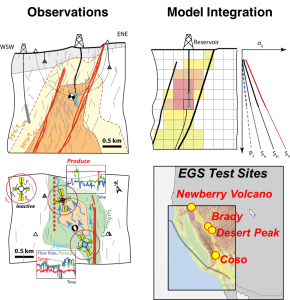Getting through the program and enjoying it:
- What will excite you enough to help you push through the hard work of graduate school?
- Can you get along with the advisor/professor/students in this program?
- Will you enjoy working in these environments?
- Will these people form a good network to aid your future career? What about the contacts your advisor might introduce you to?
- Is this a topic or aspect of earth science I can be genuinely good at?
- A master’s degree gives you a lot of flexibility in what comes next, while still giving you a boost to your understanding of geology and some new skills. A Ph.D. allows you to delve more deeply, and will require more independence. In either case, you still need to think of it as part of a path to what comes next.
Talk to your prospective advisors before you apply!
Whether or not you are accepted depends on several factors:-
- Your preparation
-
- Do they have funding and an opening
-
- Your rapport with a perspective advisor:
-
- Do they know you?
-
- Do they believe you want to come and work with them specifically?
-
- Do they believe you are interested in their specific research focus?
-
- Have you shown the planning and poise to take initiative in developing your own future and informing your plan?
-
- Your rapport with a perspective advisor:
-
- Funding and positions are limited, they have to make a case for you with the rest of the faculty and if they know you personally from professional conversations, they will be more likely to support you.
-
- You will need to feel comfortable with them, figure out if their communication style is compatible with yours, be interested in their research projects, and benefit from their connections to the other students, professors and colleagues outside of the school.
-
- Do you want a project that is open-ended with more of a role for your development or one that is already fairly outlined and controlled by your advisor as your first experience.
-
- Talk to the advisor’s current students and find out what students usually do once they graduate. They know the most on how it really works. (Just be careful, everyone has issues, so one opinion may not be entirely objective — pay attention to how they talk about their experience and what it says about them, as well as their advisor.)
How to Apply
- Review the current/recent research and their current/recent graduate students of potential advisors.
- Contact them via email and identify specific items of mutual interest.
- Some advisors will reply quickly, whereas others will wait until the deadline approaches before engaging in email, virtual meetings, or visits.
- Many faculty will indicate on their website if they are actively seeking students and at what level (MS, PhD, or PostDoc)
- If you have a BS, you can apply to the MS or PhD programs.
- If you have a MS, you can apply to the PhD program. (A second MS is atypical; consideration will require demonstrating that the prior training is fundamentally different from the program you apply to join.)
- To be considered for a PhD, prior research experience is expected. You should be a blessed to share both the products of your research such as a thesis, abstract, or manuscript and be able to discuss this work.
- You may submit materials without formally completing the application and paying the fee. Submitted materials such as a Curriculum Vitae (CV) or Resume and a Transcript will help your potential advisor assess how well you fit their research program and demonstrate your seriousness. Once there is buy-in by you and the prospective advisor, you can move to complete the application. (Note that a complete application requires official transcripts, but you can share un-official transcripts to start the process.)
- Your application must include a personal statement of research and career goals. First, in thesis-driven graduate programs (e.g., our program in Earth and Environmental Science) it is preferred that you clearly articulate these goals and discuss how they align with the prospective advisor. Your emails and conversations with your prospective advisor will help you develop a stronger statement. Second, this is a sample of your writing potential that will be scrutinized closely.
- Key links for the application process:
What’s next:
- What do you want to do after you graduate? (Academic, government, industry, in office, in the field, travel, live out west, live abroad,…)
- How does a particular program prepare you for your career goals or how will it help you identify your career goals? (e.g., building a career or seeing the jobs obtained by students in a program).
- Where do you want to live (somewhere specific, and if so where, or are you flexible)? —> Note that in regard to working in Industry, you might find that a Masters degree is your best bet.
Different job goals may require differences in your education and experience. A master’s degree gives you a lot of flexibility in what comes next, while still giving you a boost to your understanding of geology and some new skills. A Ph.D. is far narrower, focusing on depth and independent research and leaning over coursework. Some careers favor the M.S. and others favor the Ph.D. so this should be part of your planning.
v2022-12-12, © Nicholas C. Davatzes, 2016

